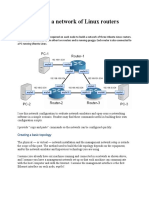Network Programming C
Uploaded by
mostafa-skyNetwork Programming C
Uploaded by
mostafa-skyHELSINKI UNIVERSITY OF TECHNOLOGY
NETWORKING LABORATORY
Introduction to Network
Programming using C/C++
Slides partly prepared by Olaf Bergmann (Uni Bremen TZI)
© 2006 Jörg Ott 1
HELSINKI UNIVERSITY OF TECHNOLOGY
NETWORKING LABORATORY
Would be giving brief introduction on...
Parsing Command line
Socket Related Address Structures
Host Name / IP Address resolution
Socket Creation
Making TCP and UDP Connection
Sending and Receiving Data
Mulitcasting
Multiplexing I/O
© 2005 Jörg Ott 2
HELSINKI UNIVERSITY OF TECHNOLOGY
NETWORKING LABORATORY
Parse Command Line
int getopt(cnt,argv,optstring)
int oc;
while( (oc=getopt(argc,argv,"a:bi:sl:D:t:")) != -1)
{
switch(oc) {
case 'a' : addAddress(optarg); break;
case 'b' : usage(); exit(0);
case 'i' : addInterface(optarg); break;
case 's' : summary = true; break;
case 'l' : dumplen = GetInt(optarg); break;
case 't' : controlAddress(optarg); break;
case 'D' : duration = GetInt(optarg); break;
default :
opterr(oc);
}
}
© 2005 Jörg Ott 3
HELSINKI UNIVERSITY OF TECHNOLOGY
NETWORKING LABORATORY
Address Structures
struct sockaddr_in {
uint8_t sin_len; /* length of structure (16) */
sa_family_t sin_family; /* AF_INET */
in_port_t sin_port; /* 16-bit TCP or UDP port number */
struct in_addr sin_addr; /* 32-bit IPv4 address */
char sin_zero[8];
};
struct in_addr {
in_addr_t s_addr; /* 32-bit IPv4 address */
};
struct sockaddr {
uint8_t sa_len;
sa_family_t sa_family; /* address family: AF_xxx value */
char sa_data[14]; /* protocol-specific address */
};
© 2005 Jörg Ott 4
HELSINKI UNIVERSITY OF TECHNOLOGY
NETWORKING LABORATORY
Address Structures Contd...
bind(), recvfrom() and sendto() function uses sockaddr structure
A normal practice is to fill the stuct sockaddr_in and cast the pointer to
struct sockaddr while socket operartions
struct hostent {
char *h_name;
char **h_aliases;
int h_addrtype;
int h_length;
char **h_addr_list;
char *h_addr;
};
gethostbyname() returns the resolved address in struct hostent
format. A hostname may have multiple interfaces, so hostent
structure is designed to hold the multiple addresses of the
resolved hostname
© 2005 Jörg Ott 5
HELSINKI UNIVERSITY OF TECHNOLOGY
NETWORKING LABORATORY
Address Conversion functions (1)
Dotted decimal notation: aaa.bbb.ccc.ddd (IPv4 only)
in_addr_t inet_addr (char *buffer)
in_addr_t inet_aton (char *buffer)
char *inet_ntoa (in_addr_t ipaddr)
aaa.bbb.ccc.ddd (IPv4), aaaa:bbbb:cccc:dddd:eeee:ffff:gggg:hhhh (IPv6)
int inet_pton(int af, const char *src, void *dst)
dst: in_addr or in6_addr
const char *inet_ntop(int af, const void *src, char *dst, size_t)
src: in_addr bzw. in6_addr
char dst[INET_ADDRSTRLEN] bzw. char dst[INET6_ADDRSTRLEN]
gethostbyname() - converts hostname (xyz.hut.fi) to struct
hostent format
© 2005 Jörg Ott 6
HELSINKI UNIVERSITY OF TECHNOLOGY
NETWORKING LABORATORY
Conversion Functions (2)
Network vs. Host Byte Order
All data in the network is sent as “Big Endian”
Conversion into local representation required (Intel)
(depends on the CPU architecture but should always be done
for portability)
netshort = htons (hostshort)
netlong = htonl (hostlong)
hostshort = ntohs (netshort)
hostlong = ntohl (netlong)
© 2005 Jörg Ott 7
HELSINKI UNIVERSITY OF TECHNOLOGY
NETWORKING LABORATORY
BSD Socket Interface
The BSD mechanism for Inter-Process Communication (IPC)
Transparency between local and remote communications
Socket Descriptor: feels like file i/o or stdin/stdout
Supports different types of communications, u.a.
SOCK_STREAM: TCP SOCK_DGRAM: UDP
SOCK_RAW: Raw IP SOCK_PACKET: Link-Layer-Frames
© 2005 Jörg Ott 8
HELSINKI UNIVERSITY OF TECHNOLOGY
NETWORKING LABORATORY
Socket Creation
int socket(domain,type,proto)
int bind(sd,addr,addrlen)
int createSocket(const sockaddr_in &addr)
{ Socke t domain
AF_INET, PF_INET6
int sd=socket(AF_INET,SOCK_DGRAM,0); Socke t type
if (sd<0) return -1; SOCK_STREAM, SOCK_DGRAM, …
Protocol
0 (a ny), 6 (tcp), 17 (udp)
int yes = 1;
setsockopt(sd, SOL_SOCKET, SO_REUSEADDR, (char*)&yes, sizeof yes);
fcntl(sd,F_SETFL,O_NONBLOCK);
if (bind(sd,reinterpret_cast<const sockaddr *>(&addr),sizeof addr)<0) {
std::cerr << strerror(errno) << std::endl;
return -1;
}
return sd;
}
© 2005 Jörg Ott 9
HELSINKI UNIVERSITY OF TECHNOLOGY
NETWORKING LABORATORY
Creating UDP and TCP connections
UDP:
Create a socket with SOCK_DGRAM
Bind the socket to a address (particular IP and port number)
Ex- bind (int sd, struct sockaddr *, socklen_t len);
Now the socket can be used for send and receive operations
TCP:
Create a socket with SOCK_STREAM
Bind the socket to a address (particular IP and port number
If program need to accept any connection request, then
listen on the socket
Listen() - allows to specify the number of backlogs of
connection requests that can be buffered
© 2005 Jörg Ott 10
HELSINKI UNIVERSITY OF TECHNOLOGY
NETWORKING LABORATORY
Connections (TCP) contd..
connect (int sd, struct sockaddr *target, socklen_t len);
Creates (synchronously) a connection
Function call only complete when the connection is established, if a timeout
occurs without response (may be several minutes), or when ICMP error
messages indicate failure (e.g., destination unreachable)
Accepting an incoming connection (cannot reject anyway )
new_sd = accept (int sd, struct sockaddr *peer, socklen_t *peerlen);
Creates a new socket descriptor for the new connection
The original one (sd) continues to be used for accepting further connections
Closing a connection
shutdown (int sd, int mode)
0: no further sending, 1: no further reception, 2: neither sending nor receiving
close(sd) to clean up – beware of data loss!
© 2005 Jörg Ott 11
HELSINKI UNIVERSITY OF TECHNOLOGY
NETWORKING LABORATORY
Sending Data
Connection-oriented (TCP)
write (int sd, char *buffer, size_t length);
writev (int sd, struct iovec *vector, int count);
List of buffers, each with pointer to memory and length
send (int sd, char *buffer, size_t length, int flags)
May be used for out-of-band data
Connectionless (UDP)
sendto (int sd, char *buffer, size_t length, int flags,
struct sockaddr *target, socklen_t addrlen)
sendmsg (int sd, struct msghdr *msg, int flags)
Target address
Pointer to the memory containing the data
Control information
© 2005 Jörg Ott 12
HELSINKI UNIVERSITY OF TECHNOLOGY
NETWORKING LABORATORY
Receiving Data
Connection-oriented (TCP)
read (int sd, char *buffer, size_t length);
readv (int sd, struct iovec *vector, int count);
List of buffers, each with pointer to memory and length
recv (int sd, char *buffer, size_t length, int flags)
May be used for out-of-band data
Connectionless (UDP)
recvfrom (int sd, char *buffer, size_t length, int flags,
struct sockaddr *target, socklen_t addrlen)
recvmsg (int sd, struct msghdr *msg, int flags)
Sender address
Pointer to the data
Control information
© 2005 Jörg Ott 13
HELSINKI UNIVERSITY OF TECHNOLOGY
NETWORKING LABORATORY
Further Functions
getpeername (int sd, struct sockaddr *peer, size_t *len)
Obtain the address of the communicating peer
getsockname (int sd, struct sockaddr *local, size_t *len)
Obtain the address of the local socket (e.g., if dynamically assigned)
Modify socket parameters
getsockopt (int sd, int level, int option_id, char *value, size_t length)
setsockopt (int sd, int level, int option_id, char *value, size_t length)
Examples:
Buffer size, TTL, Type-of-Service, TCP-Keepalive, SO_LINGER, ...
fcntl (int sd, int cmd [, long arg] [, ...]);
Non-blocking I/O
© 2005 Jörg Ott 14
HELSINKI UNIVERSITY OF TECHNOLOGY
NETWORKING LABORATORY
Multicast reception
Multicast JOIN
setsockopt (sd, IPPROTO_IP, IP_ADD_MEMBERSHIP,
struct ip_mreq *mreq, sizeof (ip_mreq));
struct ip_mreq {
struct in_addr imr_multiaddr; /* IP multicast address of
group */
struct in_addr imr_interface; /* local IP address of
interface */
};
Multicast-LEAVE
setsockopt (sd, IPPROTO_IP, IP_DROP_MEMBERSHIP, struct
ip_mreq *mreq, sizeof (ip_mreq));
Optional: Allow repeated use of an address (needed for multicasting)
char one = 1;
setsockopt (sd, SOL_SOCKET, SO_REUSEADDR, &one, sizeof
(char))
© 2005 Jörg Ott 15
HELSINKI UNIVERSITY OF TECHNOLOGY
NETWORKING LABORATORY
I/O Multiplexing (select)
int select(maxfdset,read,write,ext,timer)
Calculate file descriptor sets (FDSET)
Determine earliest timeout
Call select()
Error?
Fatal - Terminate
Repairable (e.g. interrupted system call) - repeat
Timeout?
Timer handling; use struct timeval { … } to specify (sec, usec) pair
NULL pointer == blocking (no timeout), (0, 0) == polling
Success
Determine active file descriptors and handle events
© 2005 Jörg Ott 16
HELSINKI UNIVERSITY OF TECHNOLOGY
NETWORKING LABORATORY
fd_set Makros used by select
fd_set base_set working_set;
FD_ZERO (&working_set);
FD_SET (fd, &base_set);
.
.
.
if (FD_ISSET(fd, &working_set))
. . .
© 2005 Jörg Ott 17
HELSINKI UNIVERSITY OF TECHNOLOGY
NETWORKING LABORATORY
Select() example
•
rc_select = select (sd + 1, &working_set, NULL, NULL, &select_timeout);
/* Check to see if the select call failed. */
if (rc_select < 0)
{
perror("select() failed");
check errorno and act accordingly
}
/* Check to see if the 'n' minute time out expired. */
if (rc_select == 0)
{
fprintf(stderr, "\n select() timed out. \n");
return -1;
}
/* Check to see if there is a incoming connection request */
if (FD_ISSET(sd, &working_set))
{
.......
.......
© 2005 Jörg Ott 18
HELSINKI UNIVERSITY OF TECHNOLOGY
NETWORKING LABORATORY
I/O Multiplexing (poll)
int poll(pollfd,n_fd,timeout)
struct pollfd {
int fd; // file descriptor
int events; // events to watch for
int revents; // occurred events
};
Poll events:
POLLIN input pending
POLLOUT socket writable (only needed with non-blocking i/o)
POLLHUP, POLLERR
Timeout is specified in milliseconds
-1 == no timeout, 0 == return immediately (perform real polling)
Handling otherwise identical to select()
© 2005 Jörg Ott 19
You might also like
- sample-questions-for-salesforce-certified-ai-specialist-examNo ratings yetsample-questions-for-salesforce-certified-ai-specialist-exam12 pages
- CIS 2107 Computer Systems and Low-Level Programming Fall 2011 FinalNo ratings yetCIS 2107 Computer Systems and Low-Level Programming Fall 2011 Final18 pages
- Introduction To Ada Solo Project: Robert Rostkowski CS 460 Computer Security Fall 2008No ratings yetIntroduction To Ada Solo Project: Robert Rostkowski CS 460 Computer Security Fall 200820 pages
- Bluetooth Profiles: What Is A Bluetooth Profile?No ratings yetBluetooth Profiles: What Is A Bluetooth Profile?20 pages
- Hands On Contiki OS and Cooja Simulator: Exercises (Part II)No ratings yetHands On Contiki OS and Cooja Simulator: Exercises (Part II)15 pages
- (FREE PDF Sample) Mastering Embedded Linux Programming Second Edition Unleash The Full Potential of Embedded Linux With Linux 4 9 and Yocto Project 2 2 Morty Updates Chris Simmonds Ebooks100% (5)(FREE PDF Sample) Mastering Embedded Linux Programming Second Edition Unleash The Full Potential of Embedded Linux With Linux 4 9 and Yocto Project 2 2 Morty Updates Chris Simmonds Ebooks52 pages
- Communication Protocols For Embedded SystemsNo ratings yetCommunication Protocols For Embedded Systems9 pages
- Foundations of Cryptography (CYS 602) : Lecture #1 Introduction To Cryptography and Data SecurityNo ratings yetFoundations of Cryptography (CYS 602) : Lecture #1 Introduction To Cryptography and Data Security13 pages
- Algorithm Gym - Data Structures - CodeforcesNo ratings yetAlgorithm Gym - Data Structures - Codeforces23 pages
- Exokernel: An Operating System Architecture For Application-Level Resource ManagementNo ratings yetExokernel: An Operating System Architecture For Application-Level Resource Management16 pages
- TCP-IP Lean - Web Servers For Embedded SystemsNo ratings yetTCP-IP Lean - Web Servers For Embedded Systems534 pages
- C Program To Implement A Stack: Problem DescriptionNo ratings yetC Program To Implement A Stack: Problem Description9 pages
- Generic Access Profile - Bluetooth Technology WebsiteNo ratings yetGeneric Access Profile - Bluetooth Technology Website7 pages
- Routing Protocols: Ad Hoc Wireless NetworksNo ratings yetRouting Protocols: Ad Hoc Wireless Networks78 pages
- Bottom of Form C++ Interview Questions and Answers How Can You Tell What Shell You Are Running On UNIX System?No ratings yetBottom of Form C++ Interview Questions and Answers How Can You Tell What Shell You Are Running On UNIX System?42 pages
- Networking Basics: Dept. of Computer Science Faculty of Science and TechnologyNo ratings yetNetworking Basics: Dept. of Computer Science Faculty of Science and Technology33 pages
- The Osi Model and TCP Ip Protocol SuiteNo ratings yetThe Osi Model and TCP Ip Protocol Suite24 pages
- How To Build A Network of Linux Routers Using QuaggaNo ratings yetHow To Build A Network of Linux Routers Using Quagga8 pages
- What Is C++?: C++ Interview Questions and AnswersNo ratings yetWhat Is C++?: C++ Interview Questions and Answers42 pages
- Introducing JSON: ECMA-404 The JSON Data Interchange StandardNo ratings yetIntroducing JSON: ECMA-404 The JSON Data Interchange Standard6 pages
- Advanced GitLab CI/CD Pipelines: An In-Depth Guide for Continuous Integration and DeploymentFrom EverandAdvanced GitLab CI/CD Pipelines: An In-Depth Guide for Continuous Integration and DeploymentNo ratings yet
- Ubuntu 18.04 Essentials: Learn to Install, Administer and Use Ubuntu 18.04 SystemsFrom EverandUbuntu 18.04 Essentials: Learn to Install, Administer and Use Ubuntu 18.04 SystemsNo ratings yet
- Mastering C: A Comprehensive Guide to Proficiency in The C Programming LanguageFrom EverandMastering C: A Comprehensive Guide to Proficiency in The C Programming LanguageNo ratings yet
- Mastering WebGL: Crafting Advanced 3D Web Experiences: WebGL WizadryFrom EverandMastering WebGL: Crafting Advanced 3D Web Experiences: WebGL WizadryNo ratings yet
- Mastering Nim Programming: High-Performance Metaprogramming and Compile-Time ExecutionFrom EverandMastering Nim Programming: High-Performance Metaprogramming and Compile-Time ExecutionNo ratings yet
- Network Functions Virtualisation (NFV) Release 3 Protocols and Data Models VNF Snapshot Package SpecificationNo ratings yetNetwork Functions Virtualisation (NFV) Release 3 Protocols and Data Models VNF Snapshot Package Specification15 pages
- Learn JavaScript - Loops Cheatsheet - CodecademyNo ratings yetLearn JavaScript - Loops Cheatsheet - Codecademy3 pages
- List of Practicals of XII Computer Science 083 Practical Files 2022 23No ratings yetList of Practicals of XII Computer Science 083 Practical Files 2022 235 pages
- Qatar's National ICT Plan 2015: Advancing The Digital Agenda100% (1)Qatar's National ICT Plan 2015: Advancing The Digital Agenda48 pages
- Surhów: Jump To Navigationjump To SearchNo ratings yetSurhów: Jump To Navigationjump To Search4 pages
- Student-Infinity Meta Web - PresentationNo ratings yetStudent-Infinity Meta Web - Presentation58 pages
- rn0107 Stlink Server StmicroelectronicsNo ratings yetrn0107 Stlink Server Stmicroelectronics10 pages
- (French Edition) Keith Boeckner, P.charles Brown-Oxford English For ComputinNo ratings yet(French Edition) Keith Boeckner, P.charles Brown-Oxford English For Computin29 pages
- Btech Oe 8 Sem Automation Robotics Koe 091 20230% (1)Btech Oe 8 Sem Automation Robotics Koe 091 20232 pages
- Solutions For Problems: Principles of Cyber-Physical Systems by Rajeev AlurNo ratings yetSolutions For Problems: Principles of Cyber-Physical Systems by Rajeev Alur6 pages
- 23.8 Inch 2nd Gen I Series Panel PC Product Manual-I7No ratings yet23.8 Inch 2nd Gen I Series Panel PC Product Manual-I71 page
- Webb W.Guide To ARMLinux For Developers.2002No ratings yetWebb W.Guide To ARMLinux For Developers.2002184 pages
- DW1601 DW1702 DW1703 DW1705 DW1707 and DW1901 Release Notes CS WIN7 Combo 10 14 2014 PDFNo ratings yetDW1601 DW1702 DW1703 DW1705 DW1707 and DW1901 Release Notes CS WIN7 Combo 10 14 2014 PDF15 pages
- Best Practices For The Encrypting File SystemNo ratings yetBest Practices For The Encrypting File System20 pages

























































































